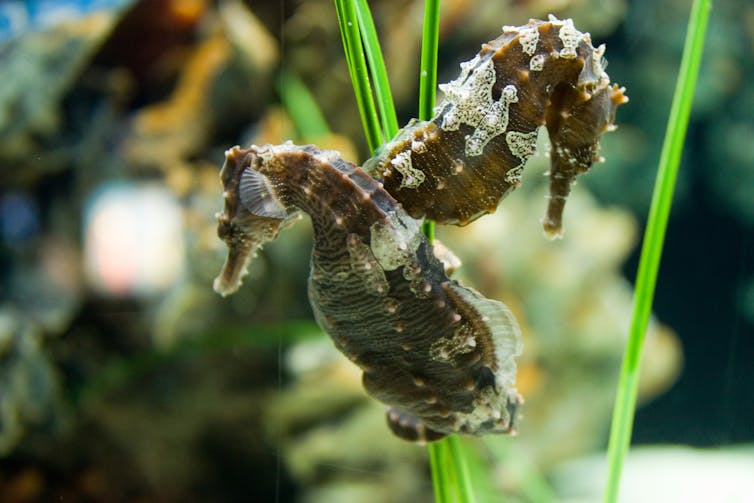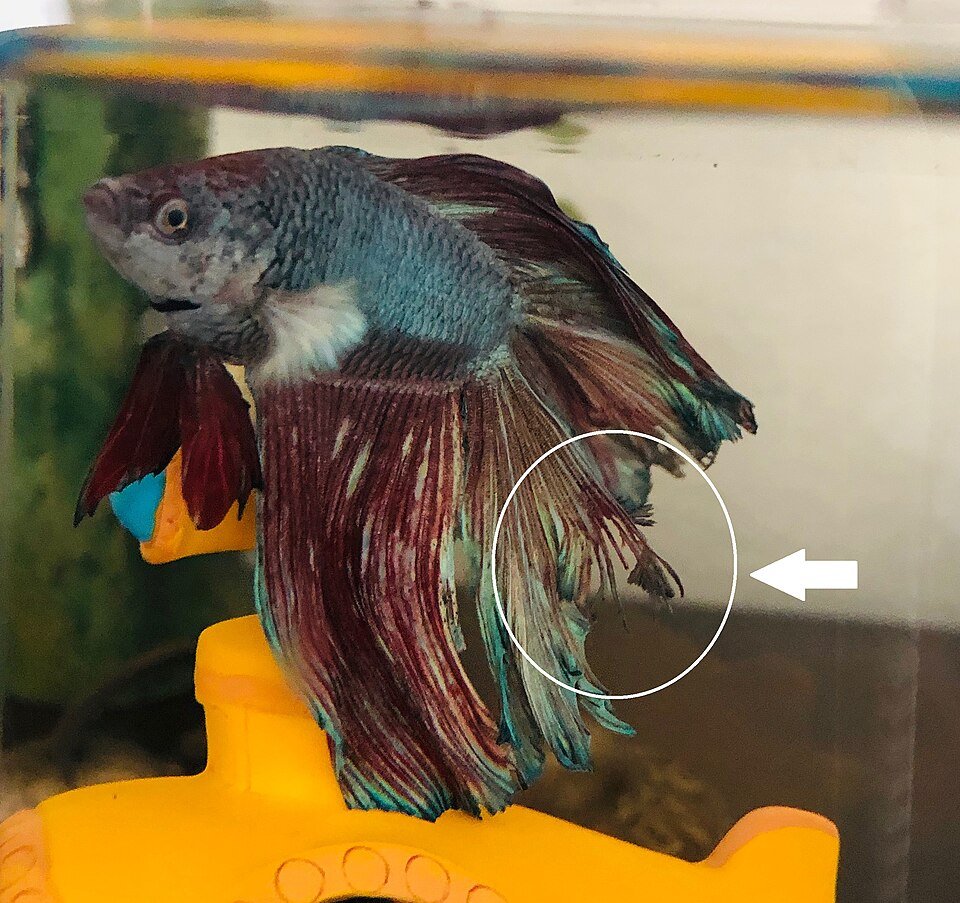
Mark Tupper, University of Portsmouth
Seahorses have long been a popular attraction in public aquariums, but they remain mysterious. They are a fish with a difference in that they swim in an upright, vertical position. They have flexible necks and long, tubular snouts that point downward, giving them the appearance of a horse’s head. Their lower bodies form a flexible, prehensile tail, which is square in outline and can wrap around objects. There are at least 47 known species, all belonging to the genus Hippocampus, a Greek term that means “horse sea monster”. So what else should we know about this creature?
They are notoriously poor swimmers
Seahorses do not have the typical pelvic, anal and caudal fins that provide thrust, lift and steering on most fishes. Instead, they propel themselves by fluttering their small dorsal fin at about 35 beats per second. Steering is accomplished using even smaller pectoral fins on the sides of their head. These pectoral fins look like ears and add to the horse-like appearance of the head. Their inability to swim well means that they sometimes die of exhaustion in rough seas .
They are masters of camouflage
Seahorses typically inhabit shallow seagrass and algae beds and coral reefs in temperate and tropical waters around the globe, typically between 45 degrees north and 45 degrees south of the equator. They are masters of camouflage. They can change their colour over time, and some species can even grow filaments (called cirri) along their body to help them blend in with their surroundings.
They ambush their prey
Camouflage is critical to seahorses as they use it to ambush their prey. They remain motionless and camouflaged, anchored to seagrasses, corals or sponges by their prehensile tail, and suck up any passing plankton or fish fry with their long, tubular snout. Seahorses must be within a few millimetres of their prey to capture them, so remaining undetected is paramount.
They have no stomach
Seahorses have no teeth and no stomach – a trait they share with a few species of wrasses, a species of brightly coloured marine fish. Food passes through their digestive tract so rapidly that they need to eat almost constantly to live and grow. A single seahorse can eat up to 3000 brine shrimp per day.
They can move their eyes independently
Seahorse eyes move independently, giving them a nearly 360-degree field of vision, so they can literally keep one eye out for predators while using the other to follow prey. However, they are bony and indigestible, and their only real predators are crabs, which grab seahorses with their pincers, and humans who collect them for traditional medicine, curios, and aquarium pets.
They mate for life
Most seahorses are monogamous and mate for life, although a few species are polygamous and change mates from one breeding cycle to the next. However, all species of seahorse mate with only one individual per breeding cycle. Seahorses can often be seen swimming in pairs with their tails linked together. They engage in a courtship dance which includes spinning around, swimming side by side and changing colours. This can last up to nine hours. This courtship dance is repeated daily, strengthening the bond between the mated seahorse pair.
Stay Always Informed
Join our communities to instantly receive the most important news, reports, and analysis from the aquaculture industry.
The males give birth to babies
Seahorses are one of the few animal species on Earth in which the male bears the unborn young. During mating, the female deposits her eggs into the male oviduct (yes, the males have an oviduct), which sits in a pouch in the male’s abdomen, called a brood pouch. The male carries the eggs in his brood pouch until they hatch into fully formed, miniature seahorses and are released into the water. Males can give birth to as few as five or as many as 1,500 young.
The males are continuously pregnant
Male pregnancy allows the females to continue making eggs while the male is pregnant with the young, allowing seahorses to reproduce more quickly. As soon as the male gives birth, the female will deposit more fertilised eggs in his brood pouch.
They are in trouble
The life history and ecology of seahorses make them particularly vulnerable to overfishing and environmental disturbance, including climate change. Their exoskeleton allows them to be dried and preserved easily. Many cultures believe seahorses to hold medicinal properties, especially traditional Chinese medicine, in which their dried bodies are believed to cure or prevent skin infections, asthma, and impotence, despite no evidence to support these claims. At least 25 million are traded annually for Chinese medicine. Fisheries harvest them faster than they can replenish their populations, leading to alarming declines in seahorse numbers.![]()
Mark Tupper, Senior Lecturer, Marine Biology (Fisheries), University of Portsmouth
This article is republished from The Conversation under a Creative Commons license. Read the original article.
Editor at the digital magazine AquaHoy. He holds a degree in Aquaculture Biology from the National University of Santa (UNS) and a Master’s degree in Science and Innovation Management from the Polytechnic University of Valencia, with postgraduate diplomas in Business Innovation and Innovation Management. He possesses extensive experience in the aquaculture and fisheries sector, having led the Fisheries Innovation Unit of the National Program for Innovation in Fisheries and Aquaculture (PNIPA). He has served as a senior consultant in technology watch, an innovation project formulator and advisor, and a lecturer at UNS. He is a member of the Peruvian College of Biologists and was recognized by the World Aquaculture Society (WAS) in 2016 for his contribution to aquaculture.







